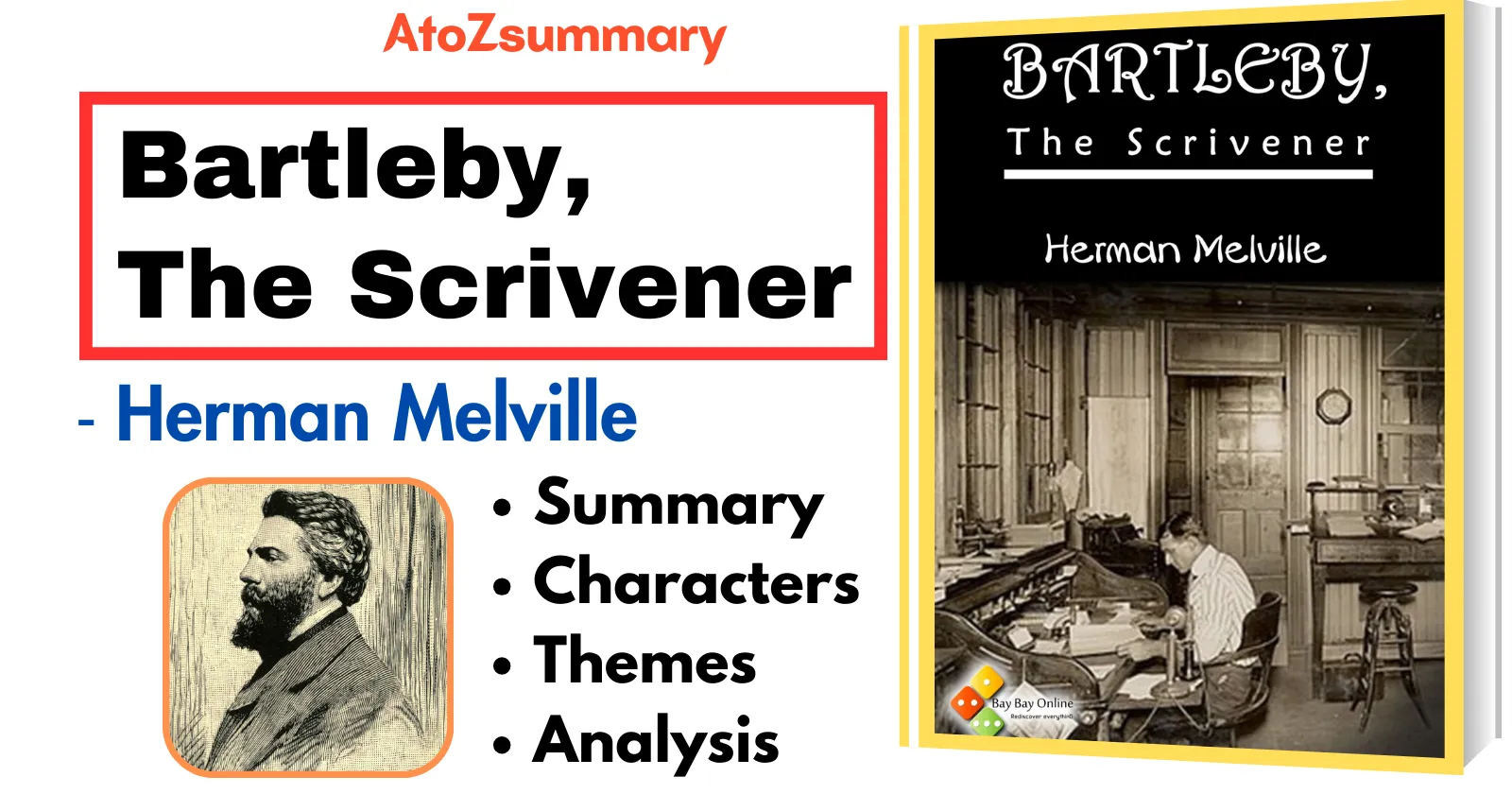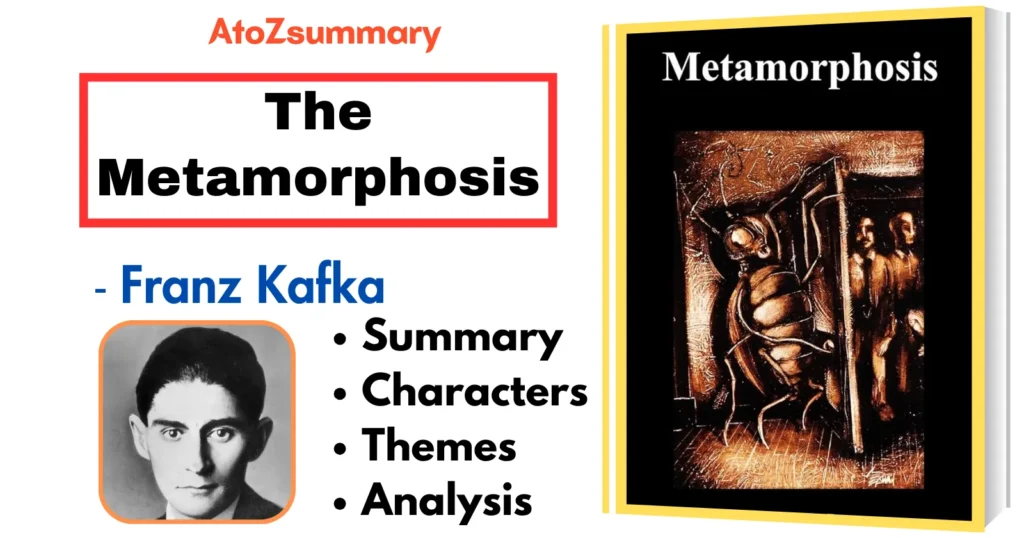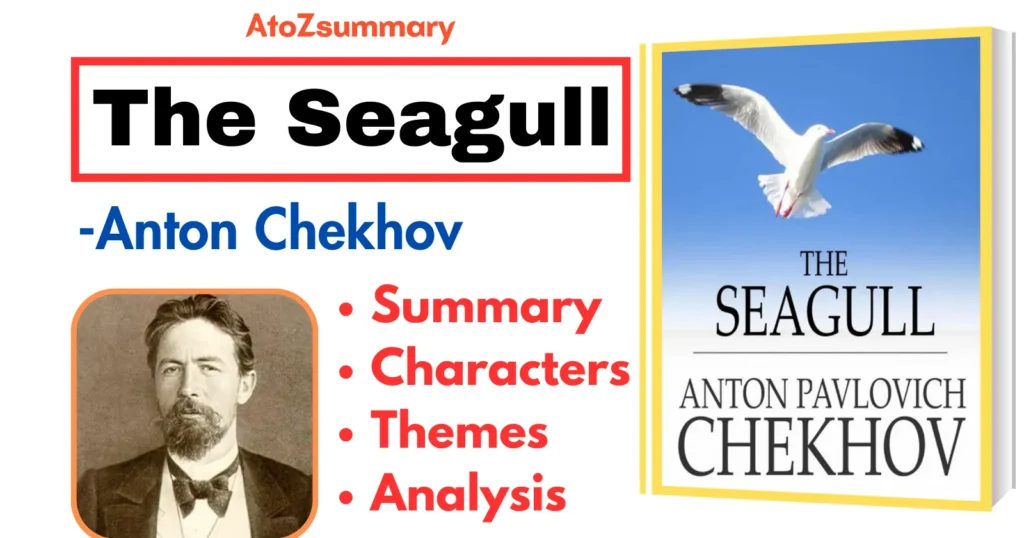About the Story: Bartleby, The Scrivener
| Title | Bartleby, The Scrivener |
| Author | Herman Melville |
| Genre | Short story, Gothic fiction |
| Publication | 1853 |
| Setting | Wall Street, New York City, 19th century |
| Themes | Alienation, isolation, existentialism, free will, determinism |
| Characters | The Lawyer (Narrator), Bartleby, Turkey, Nippers, Ginger Nut |
| Symbolism | Bartleby’s wall, the lawyer’s office, the dead letter |
| Literary devices | First-person narration, unreliable narrator, dialogue, symbolism, irony |
| Style | Melville’s prose is characterized by its use of vivid imagery, dark humor, and philosophical musings. |
Analysis: Bartleby, The Scrivener
“Bartleby, The Scrivener” by Herman Melville is a short story about a man named Bartleby who works as a copyist in a law office. At first, he’s a diligent worker, but he gradually starts refusing tasks with the phrase “I would prefer not to“. This refusal perplexes his employer and leads to Bartleby’s eventual decline.It raises questions about compassion and the consequences of societal indifference.
Characters: Bartleby, The Scrivener
The characters of “Bartleby, The Scrivener” by Herman Melville are:
- Bartleby: The main character, a quiet and mysterious scrivener (copyist) who initially works diligently but later refuses to do any task with the phrase “I would prefer not to.”
- The Narrator: A lawyer who employs Bartleby. He is both puzzled and intrigued by Bartleby’s odd behavior.
- Turkey: A scrivener working in the same office as Bartleby. He is diligent in the morning but becomes less reliable as the day progresses due to alcohol consumption.
- Nippers: Another scrivener in the office. He is irritable in the morning but works well in the afternoon.
- Ginger Nut: A young boy who runs errands for the office and provides a bit of comic relief.
Themes: Bartleby, The Scrivener
The themes of “Bartleby, The Scrivener” by Herman Melville are:
- Isolation and Alienation: The story explores the theme of isolation as the protagonist, Bartleby, withdraws from society, highlighting the effects of loneliness and alienation.
- Dehumanizing Effects of Work: The narrative examines the dehumanizing impact of repetitive and monotonous work, emphasizing how it can strip individuals of their identity and vitality.
- Power and Authority: The dynamics of power and authority are central, as the employer struggles to control and understand Bartleby, illustrating the complexities of hierarchical relationships.
- The Limits of Compassion: The story raises questions about the boundaries of compassion and the challenges of helping others when faced with someone like Bartleby, who resists conventional assistance.
- Critique of Capitalism: Melville’s work offers a subtle critique of the capitalist system, exposing its dehumanizing aspects and the toll it takes on individuals within the workforce.
Watch Full Video Summary of “Bartleby, The Scrivener”
Bartleby, The Scrivener Summary
The story begins with the lawyer providing a detailed account of his office, emphasizing its prime location and bustling atmosphere. He describes his three other scriveners: Turkey, Nippers, and Ginger Nut, each with distinct characteristics. The lawyer notes that these three employees are diligent, though not without their quirks and shortcomings.
Enter Bartleby, a new scrivener hired to assist with copying legal documents. The lawyer initially praises Bartleby’s industriousness, as he tirelessly copies documents with precision and efficiency. Bartleby’s diligence stands in stark contrast to the eccentricities of the other scriveners.
The story takes an unexpected turn when the lawyer makes a simple request of Bartleby to examine a document. Instead of complying, Bartleby calmly replies, “I would prefer not to.” This refusal becomes Bartleby’s trademark response to any request or task asked of him. Initially, the lawyer is taken aback but chooses to tolerate this unusual behavior, attributing it to Bartleby’s “pallidly neat, pitiably respectable, incurably forlorn” demeanor.
Despite Bartleby’s growing disengagement from work, the lawyer cannot bring himself to dismiss the strange scrivener. Instead, he relocates his office to avoid confrontation. Bartleby, however, follows him to the new location, further complicating the lawyer’s attempts to distance himself from this enigmatic figure.
Bartleby’s passive resistance becomes increasingly problematic, disrupting the office’s workflow and testing the lawyer’s patience. Despite his exasperation, the lawyer feels a sense of pity for Bartleby, recognizing a deeper issue at play. This sentiment is reinforced when the lawyer learns more about Bartleby’s past.
The lawyer discovers that Bartleby was previously employed at the Dead Letter Office, a place where undeliverable letters end up. This revelation sheds light on Bartleby’s withdrawn and despondent nature. The Dead Letter Office serves as a metaphor for societal neglect, and Bartleby, like the discarded letters, seems to have been abandoned by society.
As Bartleby’s condition deteriorates, the lawyer tries to help him by offering money, food, and even shelter. However, Bartleby refuses all assistance, uttering his now-famous refrain, “I would prefer not to.” This refusal becomes an existential statement, expressing Bartleby’s withdrawal from society and his rejection of the demands placed upon him.
The lawyer’s attempts to understand Bartleby lead him to reflect on the nature of humanity and compassion. He grapples with the moral dilemma of how to respond to someone who, by all societal standards, has become an outcast. The story prompts readers to consider their own attitudes toward those who fall through the cracks of societal expectations.
Eventually, the landlord of the building where Bartleby has taken up residence insists that the lawyer do something about his strange and uncooperative tenant. The lawyer, torn between sympathy and practicality, decides to move his office once again to escape the problem. However, the lawyer’s conscience continues to be haunted by Bartleby’s presence, and he becomes increasingly tormented by guilt.
In the final act of the story, the lawyer learns of Bartleby’s arrest and imprisonment for vagrancy. Despite the lawyer’s attempts to intervene on Bartleby’s behalf, the scrivener ends up in the infamous Tombs, a notorious New York City jail. The lawyer visits Bartleby in prison and attempts to understand his motives. The encounter is both heartbreaking and surreal, as Bartleby’s refusal to engage with the world reaches its peak.
Bartleby’s tragic end raises profound questions about the nature of compassion, responsibility, and the consequences of societal indifference. The story serves as a critique of a society that discards individuals who do not conform to its norms and values. Bartleby, the enigmatic scrivener, succumbs to starvation in a prison, leaving behind a lingering mystery.
In conclusion, “Bartleby, the Scrivener” is a poignant exploration of human compassion, societal alienation, and the consequences of turning a blind eye to those in need. Through the character of Bartleby, Herman Melville invites readers to reflect on their own capacity for empathy and the ethical challenges posed by a society that often values productivity over humanity. The story’s enduring relevance lies in its ability to prompt introspection and provoke discussions about the human cost of societal neglect.
FAQs
What is the point of Bartleby, the Scrivener?
The point of “Bartleby, the Scrivener” is to explore the themes of alienation, apathy, and the struggle for individuality in a cold, impersonal world.
What does Bartleby suffer from?
Bartleby seems to suffer from a mysterious and deep-seated melancholy or existential despair.
Why does Bartleby starve himself?
Bartleby starves himself in a quiet act of resistance against the dehumanizing demands of a capitalist society.
What is the most common thing that Bartleby says?
Bartleby’s most common response is, “I would prefer not to.”
What phrase does Bartleby say each time he’s asked to do something?
Bartleby politely declines every request with the phrase “I would prefer not to.”
Who is ginger nut in Bartleby?
Ginger Nut is the young office boy who runs errands and fetches snacks for the other scriveners in Bartleby, The Scrivener.
Why does the lawyer put up with Bartleby’s behavior?
The lawyer tolerates Bartleby’s odd behavior due to a mix of curiosity, compassion, and a lack of understanding.
What is the ending of story?
Bartleby, the mysterious scrivener, dies of starvation in a prison, leaving behind an enduring enigma.




![The Catcher In The Rye Summary, Themes & Characters [by J. D. Salinger] The Catcher In The Rye Summary, Themes & Characters [by J. D. Salinger]](https://atozsummary.com/wp-content/uploads/2023/06/The-Catcher-In-The-Rye-Summary-Themes-Characters-by-J.-D.-Salinger.webp)






